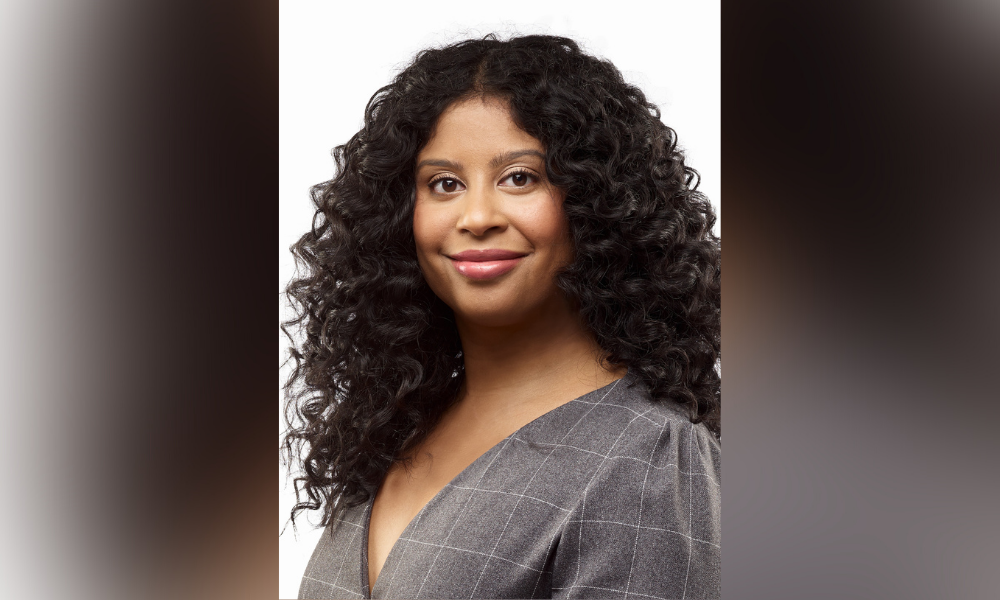
'I did a lot of things in the early stages of my career to whiten myself,' Lewis says

Atrisha Lewis, a partner at McCarthy Tétrault LLP and vice-chair of the Law Society of Ontario’s Equity and Indigenous committee, is challenging the legal profession to expand beyond its long-established patterns and traditions to remove systemic barriers and increase opportunities for marginalized lawyers.
Lewis, one of the youngest LSO benchers, says she ran for the position of LSO bencher in 2019 because she felt an urgent need to represent younger and marginalized lawyers at the regulator.
“I thought it was really important for me to run not only as a young lawyer but also as someone who would be willing to speak up and speak out against some of the opposition to the important equity initiatives of the law society.”
Lewis, who joined Tétrault McCarthy as a U of T summer student, was involved in advocacy from a young age. Working on equity issues in her commercial practice at Tétrault McCarthy motivated her to improve her chosen profession.
“Realizing that the faces around me on Bay Street, in the courtrooms and basically everywhere I went didn’t look like me at all and didn’t reflect the population of Toronto sparked, for me, an interest in advancing equity issues especially within the law.”
Lewis says she encountered many barriers in becoming a lawyer and constantly questioned her place and how she could succeed in the profession because she often stood out. Before law school, she says having no networks or connections often made her feel she was behind the curve.
“I did a lot of things in the early stages of my career to whiten myself.” For example, “I used to straighten my hair every day. I don’t do that anymore.”
Lewis hopes her position in the LSO inspires young lawyers to run for committee positions and think deeply about how the profession can be different from past years.
“Convocation is supposed to represent the legal profession, and it’s very important if you don’t see yourself represented at convocation that you run; otherwise, the decision-making body about our profession just won’t reflect our profession.”
She says she was inspired to embrace her authenticity after Hadiya Roderique’s 2017 Black on Bay Street article highlighted the difficulties and isolation experienced by Black lawyers working in Bay Street.
“I think it was truly one of the first times we had a conversation about race that was beyond just two racialized lawyers talking about their experiences behind closed doors.”
She says the article empowered her to vocalize her experiences in an article published by Canadian Lawyer. Lewis says she recognized the power in sharing her reality because she received much support and empowered others to share their experiences.
“I realized I didn’t want to be anything other than me, and so I stopped caring about trying to assimilate, and I started speaking my truth, then speaking up and doing what I thought was right, and I’ve been much happier.”
The global racial reckoning with the murder of George Floyd last year has also been a driving force in highlighting systemic discrimination and sparking change, Lewis says.
“I think people are more aware and alive to the disadvantages that different groups face, in particular, Black and indigenous people.”
Referencing her involvement in the Supreme Court of Canada’s R. v. Chouhan case on the constitutionality of removing peremptory challenges for defendants, Lewis hopes to become more involved in matters that help advance the case laws or legal thinking on race and race issues.
She currently mentors upcoming lawyers and is excited to use her skills to advance equity issues and legal reasoning on race in the profession.
The legal profession has a “discriminatory problem” concerning internationally trained lawyers and students, Lewis says.
Lewis and her mentee Samantha Del Frate encountered the lack of OCI on-campus interviews for NCA candidates — internationally trained lawyers who received their law degrees from a non-Canadian university.
She says the barriers of OCI interviews for NCA candidates are a clear example of systemic racism and discrimination and is proud of mentees who achieve a way to tear down systemic barriers and make changes that can be meaningful to the profession.
Lewis says Del Frate created an OCI day for NCA candidates and set up an on-campus interview environment for internationally trained lawyers while law firms were interviewing students from the Ontario law schools to “even the playing field for internationally trained lawyers.”
She says young lawyers must stay true to their identities and foster relationships with friends and allies to create a safe environment in the profession.
“When I was speaking out, there were definitely eyebrows being raised, and it was really important for me to have people with credibility who had my back and was in my corner, and that gave me credibility,” she says, “but they also protected me from a lot of negative feedback.”
Lewis says she is excited and honoured to join the partnership at McCarthy Tétrault.
As a lawyer advocating for equity issues, she says there is no substitute for doing the work to change the profession. “There’s a lot of work that needs to be done to do a lot of the things you want to do, but it’s worth it.”
Lewis is a member of the Canadian Association of Black Lawyers and CABL’s advocacy committee.